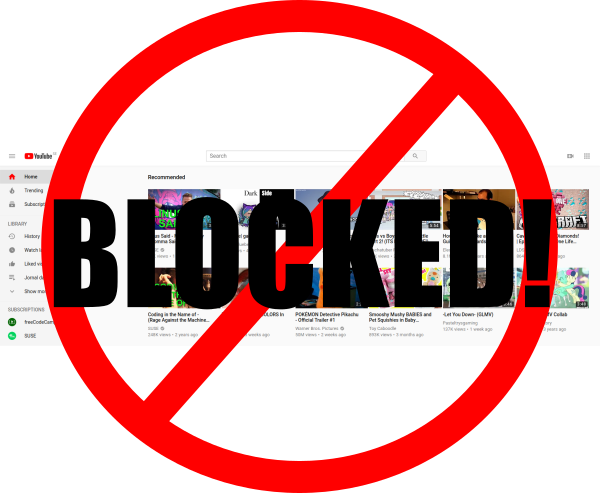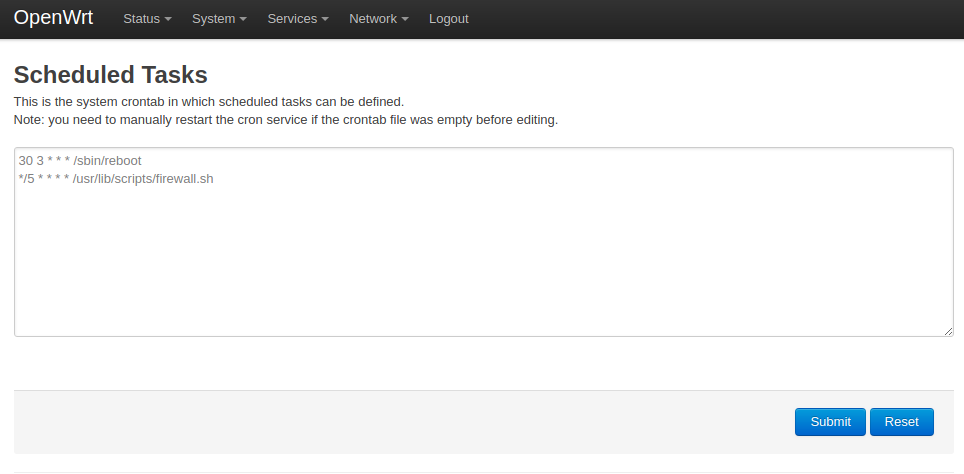
Quem tem filho sabe que não é fácil impor limites. Especialmente quanto uso de tablets ou smartphones ou até mesmo da TV. Eu tenho em casa um problema com YouTube que acaba virando a atração principal com um conteúdo bem longe de ser didático. Tentei até onde podia limitar no "YouTube é das 18 às 20" mas tenho fracassado miseravelmente.
Então resolvi apelar aos meus conhecimento computacionais e ao roteador por onde passa todo o tráfego da casa, e que roda open-wrt.
Criei um sistema básico em shell script que bloqueia tudo que é relacionado com YouTube em horários pré-determinados. Não ficou bonito, mas funciona.
#! /bin/sh
# save it into /usr/lib/scripts/firewall.sh
# and add into scheduled tasks as
# */5 * * * * /usr/lib/scripts/firewall.sh
hour=`date +%H`
minute=`date +%M`
echo "hour=$hour"
echo "minute=$minute"
status_file=/tmp/firewall_status
blocked_pattern="youtubei.googleapis.com googlevideo.com ytimg-edge-static.l.google.com i.ytimg.com youtube-ui.l.google.com www.youtube.com googleapis.l.google.com youtubei.googleapis.com video-stats.l.google.com ytimg-edge-static.l.google.com"
enable_firewall() {
echo "Enabling firewall"
for chain in INPUT FORWARD OUTPUT
do
count=1
for proto in tcp udp
do
for blocked in $blocked_pattern
do
echo iptables -I $chain $count -p $proto -m string --algo bm --string "$blocked" -j DROP
iptables -I $chain $count -p $proto -m string --algo bm --string "$blocked" -j DROP
count=`expr $count + 1`
done
done
echo iptables -I $chain $count -p udp --sport 443 -j DROP
iptables -I $chain $count -p udp --sport 443 -j DROP
count=`expr $count + 1`
echo iptables -I $chain $count -p udp --dport 443 -j DROP
iptables -I $chain $count -p udp --dport 443 -j DROP
count=`expr $count + 1`
done
}
disable_firewall() {
echo "Disabling firewall"
for chain in INPUT FORWARD OUTPUT
do
for proto in tcp udp
do
for blocked in $blocked_pattern
do
echo iptables -D $chain -p $proto -m string --algo bm --string "$blocked" -j DROP
iptables -D $chain -p $proto -m string --algo bm --string "$blocked" -j DROP
done
done
echo iptables -D $chain -p udp --sport 443 -j DROP
iptables -D $chain -p udp --sport 443 -j DROP
echo iptables -D $chain -p udp --dport 443 -j DROP
iptables -D $chain -p udp --dport 443 -j DROP
done
}
case $1 in
start) enable_firewall
echo -n "enabled" > $status_file
exit 0;;
stop) disable_firewall
echo -n "disabled" > $status_file
exit 0;;
esac
# possible status
# enabled|disabled
# start
# from 7:55-09:59
time_status=disabled
if [[ $hour -ge 7 && $hour -lt 10 ]]; then
time_status=enabled
if [[ $hour -eq 7 ]]; then
if [[ $minute -lt 55 ]]; then
time_status=disabled
else
time_status=enabled
fi
fi
fi
# from 12:00-17:59
if [[ $hour -ge 12 && $hour -lt 18 ]]; then
time_status=enabled
fi
# from 20:00-21:59
if [[ $hour -ge 20 && $hour -lt 22 ]]; then
time_status=enabled
fi
echo "time_status=$time_status"
current_status=
if [[ -f "$status_file" ]]; then
current_status=`cat $status_file`
fi
if [[ $current_status = $time_status ]]; then
echo "nothing to do"
else
if [[ $time_status = "enabled" ]];then
echo "loading firewall rules"
enable_firewall
fi
if [[ $time_status = "disabled" ]];then
echo "removing firewall rules"
disable_firewall
fi
echo -n $time_status > $status_file
fi
Basta salvar o arquivo em /usr/lib/scripts/firewall.sh e adicionar à crontab do open-wrt.

O código fonte está também publicado no github: https://github.com/helioloureiro/homemadescripts/blob/master/openwrt-firewall-block-youtube.sh

